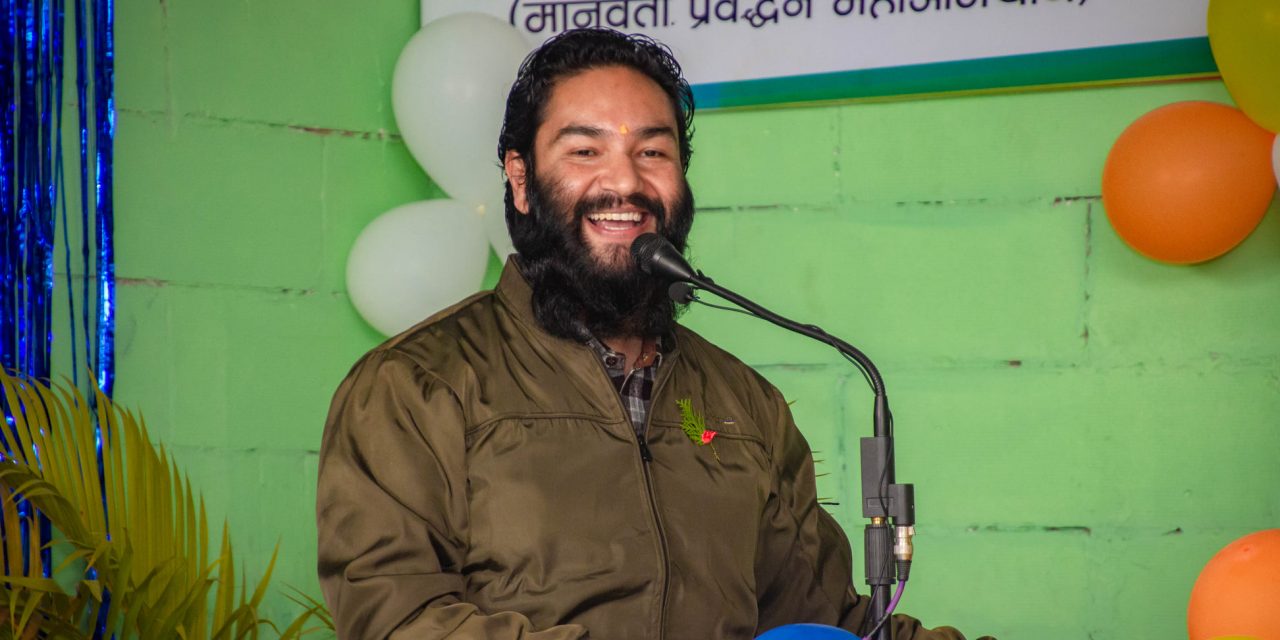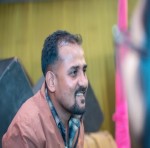Anjana Chaudhary
Ramji Adhikari, founder president of Manav Seva Ashram. He was born in Savik Khoplan gavis of Gorkha district, now Palungtar municipality ward no. 2 Satdobate was born on October 10, 2043, from the womb of father Baburam Adhikari and mother Indra Kumari Adhikari. Ramji's childhood did not pass in one place. Ramji's father was in the Nepal Army, so he went to Kathmandu with his father. And studied till class 4 in Kathmandu. Then his father retired and Ramji also returned to his birthplace Gorkha. After coming to Gorkha, he continued with the rest of his studies. He passed SLC in 2058 from Annapurna Secondary School. After that, he went to Kathmandu to study again. He studied class 11 and 12 in Brufill International College. After that, he did the rest of his studies at Min Bhawan Campus.
Ramji says that his childhood was spent happily. I am the only son of my parents, I grew up in their very good culture, the love, inspiration and culture given by my parents has given me the inspiration to move forward in humanitarian service, he says. He says that during his childhood, he did not have to do much other than studying. "My parents used to say that I should grow up and become a good person, that's why my attention was focused more on my studies," he says, but when he was at home, he used to help his parents in the farming work and go to Gaigwala. "After being born in a middle-class family, it is natural to help parents in housework," he says.
I thought of doing something different
Ramji says that during his childhood, he thought of doing a different job than others, rather than getting a government job, or becoming this or that. I have to live not only for myself, but also for others, after being born as a human being, I should eat like an animal, not only that kind of feeling, but I should help those who have less opportunities than myself, and I had a feeling that I should work differently from others'' he says. It's the inspiration I got from my parents. He says - 'After passing the SLC, he went to Kathmandu for the rest of his studies and met with various motivational people. After that, he got the motivation to do something different from the others with the inspiring words that he should work to make Nepal even better than it is.'
The path of human service….
Ramji joined the Matri Sanstha (Sarvokrishta Jeevan, Satsotva Chintan) of Manavseva Ashram since 2068. The organization was carrying forward the Sacho Jeevan Nirman Abhiyan program. Ramji used to go to different districts to facilitate that program. And motivational programs were held that the society should be made positive, character should be made good. After returning from the program, I used to see mentally deranged parents and grandparents,' he says. He used to give the help he could and the food he had to those people. My friends and I used to buy food and feed the people sitting on the street, but the next day they would be sitting on the street again.
We did not solve the problem by buying each one and feeding them, every time they used to beg for food from street stalls, their life did not change. How many prostitutes used to live on the streets. I felt that there should be arrangements for those people, roofs, human rights should also be there for them," he says. How many elderly parents were inspired to take them to old age homes and to keep their parents in children's homes, but people with mental health problems and those who cannot urinate on their own, they do not have citizenship, they do not have identity cards, they should not be kept in old people's homes and children's homes. At that time, he thought that he had to do something for such people, he needed food.
After that, Ramji and his friends organized a one-day picnic event. It was decided that not only friends would go to the picnic, but they would go to the picnic with their parents who were sitting on the road suffering from grief. Even if it was only for one day, the purpose was to feed such people, make them clean, and treat them with medicine. At that joint dinner, 18 people who were on the streets of Hetouda Municipality were gathered and taken to the picnic spot. Some of the people who reached there were very mentally deranged, with wounds and worms in their bodies, and it was a very painful situation. "After taking them to the picnic site, cutting their hair, bathing, putting on new clothes and cleaning the wounds of those who needed medical treatment, seeing the happiness on their faces brought a kind of heavenly joy to all of us," he says.
Before we were friends, we couldn't go near the people who brought them from the street, we used to smell when we got close, now after cleaning them and feeding them, the group of people taking pictures with them started to grow, and we got some kind of inspiration that we should do this kind of work, he says. After the picnic event, the organizers had no plan as to where to keep such people. Therefore, in the evening, we were taken back to the same road and left. The plan was to have dinner with them. Then those people were taken to the street and released. He says that after leaving them on the street, he and his friends could not sleep all night.
"What is a bigger sin than this, we showed hope to people and built a clean and tidy house, and then left them on the street, he said. At that time, I felt a lot of pain in my heart. After waking up in the morning, he went to the current General Secretary of Manav Seva Ashram, Shushila KC and Central Secretary Suman Bertaula, and asked them that they too did not sleep all night because of their grief. Initially, the Manavseva Ashram was started in Hetauda. After rescuing five such people from street boxes, the ashram started by renting two flats. He says that after starting the ashram, both positive and negative processes came from the society. Some of them helped Muri instead of fists, some of you also came saying that we are here too. But there were many people who were discouraging that how can you do the work that the government has not been able to do, the government has not been able to control them, how can you do it, one day you will leave again. But people who say you can't do it after constantly working, have become our parents and have inspired us," he says. At the beginning, there were three people when human service was established, gradually the number of parents well-wishers increased, now there are thousands of parents all over the country, 100 people dedicated to the service and 100 pet volunteers.
Challenge
The challenge is even now in running the Manav Seva Ashram. 23 services have been operated in 17 districts of seven provinces. People of all age groups are found in the streets, from the destitute, those with mental health problems, intellectual disabilities, physical disabilities, children who came to the street after being rejected by their own families. Until today, under the roof of the Manav Seva Ashram, we have served more than 1,000 parents with mental health problems, 150 people. Children of which 35 were born in children's ashrams, they do not know who the father is, the mother does not know about herself, there are 36 children born to such women, there are many challenges when serving such many categories together, but even in this challenge, we served with love. Because we see opportunities even in challenges and move forward' he says.
But he says that no foreign donor has been given any kind of support. Currently, the monthly expenditure of district ashrams across the country is around 2 crores. He says that he spends between 5 to 7 lakhs per month in Dong alone. But it is only the Nepali philanthropic mind that has helped. At present, we are trying to find the center, state and local cooperation, but the kind of encouraging progress that should have happened has not happened, but there has definitely been some cooperation. He said that now 40 percent of the support is from the government. But he says that sometimes there is a problem of what to feed tomorrow. He said that the economic challenge is in its place and there is also the challenge of social culture. "Until the three-tiered government takes the responsibility of road people, we will have a challenge," he says.
Every person walks with one purpose or the other, the campaigners dedicated to human service have made service the purpose of life, he says, the people who have less opportunities than themselves do not get the same kind of happiness from others. "People try to be happy with money and sex, but it hurts after a few days, but we get happiness and inner peace from selfless service, because it is clear that we are moving forward in service, we are not so sad". But the situation of the society is saddened by the events. But as we are students of positive thinking, we also see positive in negative things," he says.
That sad day
Ramji says that the saddest moment in his life was when he lost his sister. He says that when he lost his sister in the year 2058, now that he is a brother who does not have a sister, he feels a lot of pain at the time of Vhaitika. But he said that the moments when a destitute person who suffered on the street is brought to the ashram or reunited with his family are very happy moments for campaigners like him. The officer says that he is very satisfied with the work he is doing now. "I was 24, 25 years old when I started the Manav Seva Ashram, when I was working at home, my parents used to say that it is time for you to study, you should pass your Master's, PhD, get a good job and earn money, ride a car, but I am in real Anand Seva. He said, "I started informing my parents about the importance of service. Now my whole family is supporting me. I am satisfied that my parents are serving in the ashram," he says.
Married life
Ramji Adhikari got married on 27th of Asar in 2069 from Chitwan. He had married according to his parents' choice. "After my parents started talking about the marriage, I started talking to the girl on the phone. I also felt good, my parents also said that the girl is fine and we got married," he says. He says that he is very satisfied with his life partner now. They have one daughter, but he says he has 151 children because the 150 children in the ashram call him father.
Future plans
His future plan is to declare Nepal as road human free within the next 4 years, after all the road humans are managed, to manage the cows, calves, and dogs that were left in a disorderly manner, then humanities study centers (teaching lessons of humanity) schools, colleges, training centers in all seven provinces. The aim is to establish, to establish Senior Citizen Mindfulness Centers in all seven provinces and to serve the Human Service Ashram worldwide, a social organization started in Nepal. His aim is to make Nepal known as the country of humanity.






